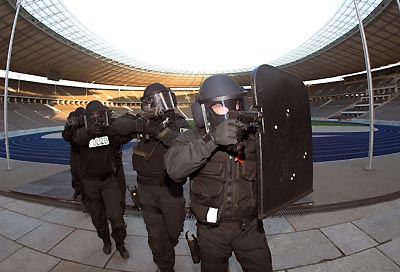Germany is hoping for the best but planning for the worst as it tackles the
formidably complex job of protecting the World Cup against a terrorist attack.
"There is no such thing as 100 percent security, but everything that's
humanly possible has been done," Interior Minister Wolfgang Schaeuble said this
week as he declared the country ready for the June 9 kick-off.

Members of Berlin's
police special force make their way during a drill to enter the
Olympic stadium in this November 8, 2005. Security preparations for the
32-nation tournament have focused on terrorism, hooliganism and petty
crime, Berlin's police chief Dieter Glietsch told a news conference 11
days before the World Cup, during which Berlin will host six matches
including the final. [filephoto] |
There is no concrete indication that Islamist militants are planning attacks
during the 31-day tournament, officials say, but the general "abstract risk" is
high.
"Anyone staging the World Cup in 2006 has to take into account that there may
be a terrorist threat," says August Hanning, a former spy chief now at the
interior ministry who has liaised closely with foreign countries on security
planning.
Or as the U.S. State Department puts it on its travel Web site: "Al Qaeda's
demonstrated capability to carry out sophisticated attacks against sizable
structures -- such as ships, large office buildings, embassies, and hotels --
makes it one of the greatest potential threats to the World Cup."
Germany knows from its own traumatic experience how a joyous festival of
sport can turn into a bloodbath: Palestinian "Black September" guerrillas
murdered 11 Israeli athletes at the 1972 Munich Olympics which it had billed as
the "Happy Games".
Last time the World Cup was held in Europe, in France in 1998, Belgian
authorities foiled a suspected plot by Algerian militants to launch an attack
during the tournament.
The 2002 competition in Japan and South Korea passed off calmly but amid
massive and intrusive security, less than a year after the September 11 attacks
on the United States.
Four years later, Germany is seeking a difficult balance: to keep people safe
without turning the event into a "big police exercise", as Schaeuble put it.
EYE IN THE SKY
A NATO fleet of AWACS surveillance aircraft, each able to detect low-flying
targets from as far away as 400 km (215 nautical miles), will patrol the skies
to detect hostile aircraft and direct fighter planes to intercept them.
Border checks, normally waived at Germany's frontiers for road and rail
travellers, will be selectively introduced as a safeguard against both militants
and hooligans.
A special World Cup security unit in the interior ministry, including experts
from police bodies Interpol and Europol, has already been working around the
clock for nearly two weeks to pool intelligence on every type of threat.
Statistics only begin to hint at the size of the challenge: 32 teams, 64
matches, 12 stadiums, some 3.2 million spectators and an estimated 1.5 million
fans from abroad -- with or without tickets -- who are expected to travel to
Germany for an event lasting over a month, nearly twice as long as the Olympic
Games.
A quarter of a million officials, stadium employees, stewards, journalists
and others have had to undergo security screening in order to receive their
accreditation.
Teams like the United States and England, seen as high-risk because of their
role in the war on terrorism, will get special protection at hotels, training
grounds and as they criss-cross the country between games, requiring close
coordination between the security services of Germany's 16 federal states.
But the German hosts are adamant that they will not allow security to smother
the party mood or betray the tournament's constantly repeated motto, "A Time to
Make Friends".
"We all want secure matches," Schaeuble told officials from 40 countries at
the last big planning meeting in late March, "but we don't want to stage a world
security championship."